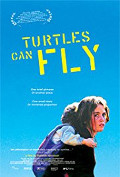
Directed by
Bahman Ghobadi
95 minutes
Rated M
Reviewed by
Sharon Hurst

Turtles Can Fly
Synopsis: In a village on the Iraq/Turkey border, a group of Kurdish refugee children scavenge for a living, collecting landmines and selling them as scrap metal. With only a few days before the US-led invasion of Iraq, the villagers are desperate for a satellite to hear news of the impending war. A clairvoyant boy, his sister and a small toddler arrive from a neighbouring village and we are drawn into their story.This is a film to tear your heart out, one whose story echoes the cataclysm about to befall Iraq but which also provides a microcosm of the injustices done to all the innocent victims of war, particularly children. Ghobadi's debut feature A Time for Drunken Horses also dealt with displaced people, those living a half-life under extreme conditions. Here he focuses on the children, who, although desperate, manage in the way that children everywhere seem to, to get a small measure of happiness out of their meagre lives. Much of their sense of purpose is provided by a 13-year-old boy called Satellite (Soran Ebrahim), who is effectively in charge of their daily activities, organising them to work clearing local fields of landmines. He is the one who trades the mines in the town for a satellite dish, and the one who proudly sets it up for the village elders. Such presence, power and maturity in one so young is inspiring and tragic at the same time.
The little family that arrives in the village consists of Agrin (Avaz Latif), a beautiful and sad young girl who carries her blind toddler, Riga (Abdol Rahman Karim), a child borne of a brutal rape. Her brother Hengov (Hiresh Feysal Rahman), the victim of a landmine, has no arms. Agrin hates her baby because of the memories he evokes, but Hengov loves the child with a compassion and caring that is achingly beautiful. Cinematographer Shahriar Assadi captures some exquisite moments, such as when Agrin is silhouetted against a rocky outcrop at sunset, or when a huge obsolete tank is lowered to the ground to be used as a dwelling for Satellite. The images of village life, with its mud, chaos and disused weaponry are compelling, as is an impressive opening scene of villagers trying to erect dozens of TV aerials on a hill.
Despite the bleakness of this film, there are surprising moments of humour, especially in the characters of Satellite's minions, Pashow and Shirkooh, who are endearingly optimistic, enthusiastic and loyal. All the kids give wonderful performances.
The film does not proselytize. Despite the oppression the Kurds have endured, Ghobadi doesn't try to draw some sweeping overview or political indictment; rather he concentrates on individuals, and this is all the more powerful in promoting his views. The irony is not lost on the audience as American choppers drop flyers declaring, "This is the end of injustice - we will make this country a paradise", or when Pashow brings to Satellite the hand from the toppled statue of Saddam. As the villagers watch Bush on TV they declare "The world is in his hands". The film's perspective is non-judgmental - more a reflection of a tragedy that bewilders the individual watching it.

Want more about this film?


Want something different?




